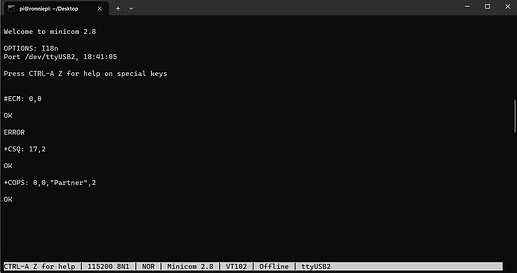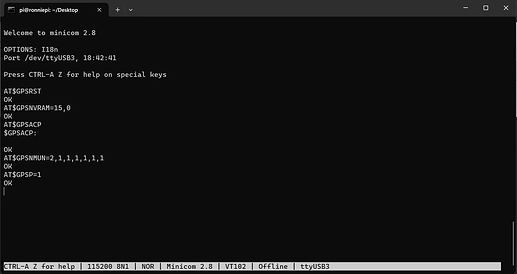Hi there,
I was trying to figure out how to obtain GPS position with the 3g-4g-lte Base HAT and a Telit LE910C4-EU using this tutorial. My final goal here is to have a python script that obtains NMEA sentences as soon as the RPi is turned on.
When following the instructions under the “Telit Modules” section, I noticed I can’t write any commands after running sudo minicom -b 115200 -D /dev/ttyUSB2 in the terminal, like the tutorial suggests. I got some messages I honestly don’t understand:
After that I tried to run the following command:
sudo minicom -b 115200 -D /dev/ttyUSB3
And it worked, I was able to perform all the steps in the tutorial:
And when running the last command in the tutorial, sudo minicom -b 115200 -D /dev/ttyUSB1 I was able to see the NMEA stream (without real data because I was sitting inside a building, but that is not the issue).
After that, I tried to run the python code suggested in the “Quectel Modules” section, with the unnecessary part removed:
from time import sleep
import serial
port = "/dev/ttyUSB1"
def parseGPS(data):
print(data, end='') #prints raw data
if data[0:6] == "$GPRMC":
sdata = data.split(",")
if sdata[2] == 'V':
print("\nNo satellite data available.\n")
return
print("-----Parsing GPRMC-----")
time = sdata[1][0:2] + ":" + sdata[1][2:4] + ":" + sdata[1][4:6]
lat = decode(sdata[3]) #latitude
dirLat = sdata[4] #latitude direction N/S
lon = decode(sdata[5]) #longitute
dirLon = sdata[6] #longitude direction E/W
speed = sdata[7] #Speed in knots
trCourse = sdata[8] #True course
date = sdata[9][0:2] + "/" + sdata[9][2:4] + "/" + sdata[9][4:6] #date
variation = sdata[10] #variation
degreeChecksum = sdata[13] #Checksum
dc = degreeChecksum.split("*")
degree = dc[0] #degree
checksum = dc[1] #checksum
latitude = lat.split() # parsing latitude
longitute = lon.split() # parsing longitute
print("\nLatitude: " + str(int(latitude[0]) + (float(latitude[2])/60)) + dirLat)
print("Longitute: " + str(int(longitute[0]) + (float(longitute[2])/60)) + dirLon)
print("time : %s, latitude : %s(%s), longitude : %s(%s), speed : %s,True Course : %s, Date : %s, Magnetic Variation : %s(%s),Checksum : %s "% (time,lat,dirLat,lon,dirLon,speed,trCourse,date,variation,degree,checksum))
def decode(coord):
#Converts DDDMM.MMMMM -> DD deg MM.MMMMM min
x = coord.split(".")
head = x[0]
tail = x[1]
deg = head[0:-2]
min = head[-2:]
return deg + " deg " + min + "." + tail + " min"
print("Receiving GPS data\n")
ser = serial.Serial(port, baudrate = 115200, timeout = 0.5,rtscts=True, dsrdtr=True)
while True:
data = ser.readline().decode('utf-8')
parseGPS(data)
sleep(2)
And it seemed to work - gave me a stream of NMEA sentences.
The problem is when I reboot the RPi, I have to set up the module’s GPS configuration from the beginning, as it probably goes back to its default settings. So, my question is:
- Is there a way to perform the configuration step (with the minicom command, shown in the second image) using some python lines?
- Alternatively, is there a way to make the module not reset its settings when rebooted?
- What was I seeing when I ran the
sudo minicom -b 115200 -D /dev/ttyUSB2command? (in the first image)
Thanks in advance,
Guy

